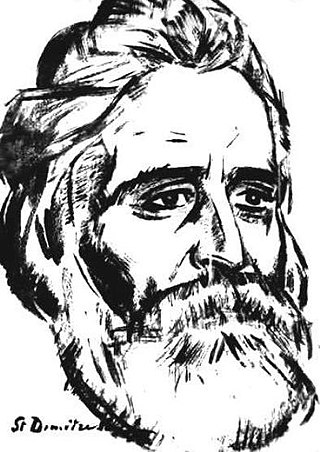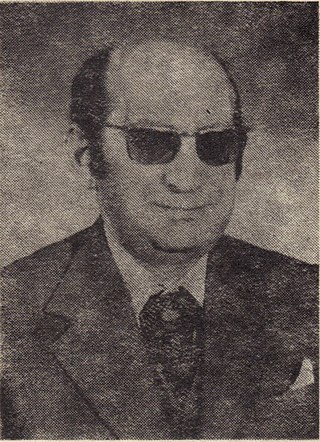Junimea was a Romanian literary society founded in Iași in 1863, through the initiative of several foreign-educated personalities led by Titu Maiorescu, Petre P. Carp, Vasile Pogor, Theodor Rosetti and Iacob Negruzzi. The foremost personality and mentor of the society was Maiorescu, who, through the means of scientific papers and essays, helped establish the basis of the modern Romanian culture. Junimea was the most influential intellectual and political association from Romania in the 19th century.

Ioan I. Cantacuzino was a renowned Romanian physician and bacteriologist, a professor at the School of Medicine and Pharmacy of the University of Bucharest, and a titular member of the Romanian Academy. He established the fields of microbiology and experimental medicine in Romania, and founded the Ioan Cantacuzino Institute.

Gheorghe Cristescu was a Romanian socialist and, for a part of his life, communist militant. Nicknamed "Plăpumarul", he is also occasionally referred to as "Omul cu lavaliera roșie", after the most notable of his accessories.

Garabet Ibrăileanu was a Romanian-Armenian literary critic and theorist, writer, translator, sociologist, University of Iași professor (1908–1934), and, together with Paul Bujor and Constantin Stere, for long main editor of the Viața Românească literary magazine between 1906 and 1930. He published many of his works under the pen name Cezar Vraja.

Constantin Dobrogeanu-Gherea was a Romanian Marxist theorist, politician, sociologist, literary critic, and journalist. He was also an entrepreneur in the city of Ploiești. Constantin Dobrogeanu-Gherea was the father of communist activist Alexandru Dobrogeanu-Gherea and of philosopher Ionel Gherea.
The Peasants' Party was a political party in post-World War I Romania that espoused a left-wing ideology partly connected with Agrarianism and Populism, and aimed to represent the interests of the Romanian peasantry. Through many of its leaders, the party was connected with Poporanism, a cultural and political trend in turn influenced by Narodnik ideas. In 1926, it united with the Romanian National Party to form the National Peasants' Party (PNȚ).

Constantin G. Stere or Constantin Sterea was a Romanian writer, jurist, politician, ideologue of the Poporanist trend, and, in March 1906, co-founder of the literary magazine Viața Românească. One of the central figures of the Bessarabian intelligentsia at the time, Stere was a key actor during the Union of Bessarabia with Romania in 1918, and is associated with its legacy.

Virgil Traian N. Madgearu was a Romanian economist, sociologist, and left-wing politician, prominent member and main theorist of the Peasants' Party and of its successor, the National Peasants' Party (PNȚ). He had an important activity as an essayist and journalist, being for long a member on the editorial board for the influential Viața Românească.

Lothar or Lotar Rădăceanu was a Romanian journalist and linguist, best known as a socialist and communist politician.

Constantin Rădulescu-Motru was a Romanian philosopher, psychologist, sociologist, logician, academic, dramatist, as well as left-nationalist politician. A member of the Romanian Academy after 1923, he was its vice president in 1935–1938, 1941–1944, and its president between 1938 and 1941.

Constantin Mille was a Romanian journalist, novelist, poet, lawyer, and socialist militant, as well as a prominent human rights activist. A Marxist for much of his life, Mille was noted for his vocal support of peasant emancipation, for his early involvement with the Romanian Social Democratic Workers' Party (PSDMR), and his presence at the head of several magazines, culminating in his association with the moderate left-wing newspapers Adevărul and Dimineața. After serving as an independent member of the Chamber of Deputies for one mandate (1899-1903), he aligned his views with those of Take Ionescu, and became a supporter of Romania's entry into World War I alongside the Entente Powers. In addition to his political career, Mille was the author of two autobiographical novels.

Zigu Ornea was a Romanian cultural historian, literary critic, biographer and book publisher. The author of several monographs focusing on the evolution of Romanian culture in general and Romanian literature in particular, he chronicled the debates and meeting points between conservatism, nationalism, and socialism. His main early works are primarily dedicated to the 19th and early 20th century cultural and political currents heralded by Junimea, by the left-wing ideologues of Poporanism and by the Sămănătorul circle, followed independently or in relation to one another. Written as expansions of this study were Ornea's biographical essays on some of the period's leading theorists: Titu Maiorescu, Constantin Dobrogeanu-Gherea and Constantin Stere.

Zamfir Constantin Arbore was a Bukovinian-born Romanian political activist originally active in the Russian Empire, also known for his work as an amateur historian, geographer and ethnographer. Arbore debuted in left-wing politics from early in life, gained an intimate knowledge of the Russian revolutionary milieu, and participated in both nihilist and Narodnik conspiracies. Self-exiled to Switzerland, he became a member of the International Workingmen's Association. Arbore was mostly active as an international anarchist and a disciple of Mikhail Bakunin, but eventually parted with the latter to create his independent group, the Revolutionary Community. He was subsequently close to the anarchist geographer Élisée Reclus, who became his new mentor.

Henric Sanielevici was a Romanian journalist and literary critic, also remembered for his work in anthropology, ethnography, sociology and zoology. Initially a militant socialist from the political-philosophical circle of Constantin Dobrogeanu-Gherea, he incorporated other influences and, in 1905, created his own literary review, Curentul Nou. Sanielevici and his friend Garabet Ibrăileanu were among the founders of "Poporanism", a peasant-oriented and left-wing movement. However, Sanielevici soon detached himself from both Marxism and agrarianism, criticizing Romanian traditionalist literature, and prophesying a Neoclassicism for the working men. His heated polemic with the rival school of Sămănătorul journal isolated him from the other Poporanists, whom he eventually denounced as "reactionaries". More controversy surrounded his ambiguous attitudes during World War I.

Anton Costache Bacalbașa was a Romanian political journalist, humorist and politician, chiefly remembered for his antimilitaristic series Moș Teacă. Together with his brothers Ioan and Constantin, he entered public life as a republican and socialist militant. For a while, his career was intertwined with that of Marxist doyen Constantin Dobrogeanu-Gherea, who inspired in him the idea of a socialist art addressed to the masses. He was himself a popularizer of Marxist ideas, and one of the first Marxist intellectuals in Romanian political history.
The Narodniks were members of a movement of the Russian Empire intelligentsia in the 1860s and 1870s, some of whom became involved in revolutionary agitation against tsarism. Their ideology, known as Narodism, Narodnism or Narodnichestvo, was a form of agrarian socialism though it is often misunderstood as populism.

George Ion Diamandy or Diamandi, first name also Gheorghe or Georges, was a Romanian politician, dramatist, social scientist, and archeologist. Although a rich landowner of aristocratic background, he was one of the pioneers of revolutionary socialism in France and Romania, obtaining international fame as founder of L'Ère Nouvelle magazine. He was an early affiliate of the Romanian Social-Democratic Workers' Party, but grew disenchanted with its radical policies, and, as a member of its "generous youth" faction, played a major part in dissolving it. With other members of this reformist group, he joined the National Liberal Party, serving as one of its representatives in Chamber.
The Social Democratic Workers' Party of Romania, established in 1893, was the first modern socialist political party in Romania. A Marxist organization, the PSDMR was part of the Second International and sent its representatives to the first five congresses of that organization. Never a strong organization, the RSDWP was further weakened following an organizational split in February 1900, only reviving after 1905. In February 1910 the PSDMR was absorbed into a new organization, the Romanian Social Democratic Party (PSDR), effectively ending its existence in its original incarnation.

Ionel Gherea, also known as Ioan Dobrogeanu-Gherea or Ion D. Gherea, was a Romanian philosopher, essayist, and concert pianist. The son of Constantin Dobrogeanu-Gherea, a Marxist theoretician and critic, and the brother of communist militant Alexandru "Sașa" Gherea, he was only mildly interested in politics of any kind, embracing an apolitical form of left-libertarianism. Largely self-taught, he became interested in the aestheticism of his brother-in-law, Paul Zarifopol, who became one of his main references. As a youth, Zarifopol took him to meet playwright Ion Luca Caragiale and his family, who were also influential on Gherea's writing, and the focus of his old-age memoirs. Gherea's debut as a writer was a 1920 novel written jointly with Luca Caragiale, which was also his only contribution to the genre. Following Constantin's death and Sașa's imprisonment, he had to handle family affairs, but his mismanagement of their money led him into remorseful despair; in 1924, he briefly disappeared, and was presumed to have committed suicide.

Paul Bujor was a Romanian zoologist, physiologist and marine biologist, also noted as a socialist writer and politician. Hailing from rural Covurlui County, he studied biology in France and Switzerland, where he was attracted by left-wing ideas; his evolutionary biology, informed by the work of Carl Vogt, veered into Marxism and irreligion. Returning to the Kingdom of Romania, he was a junior member of the Romanian Social Democratic Workers' Party, active on its moderate wing. He earned the critics' attention in the 1890s as a short story writer with a socialist and pacifist message, but only returned to fiction writing briefly, in the 1930s. An award-winning ichthyologist, Bujor was hired by the University of Iași, where he taught for 41 years, and throughout the period worked on documenting the Black Sea fauna, and made discoveries concerning the environment of Techirghiol Lake. He inaugurated the Romanian study of animal morphology, while also contributing to histology, embryology, and parasitology, and gave popular lectures on evolution and physical culture.















